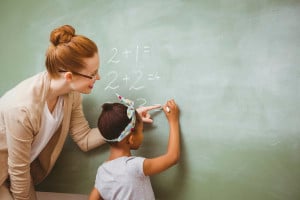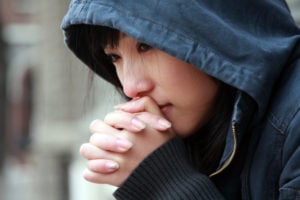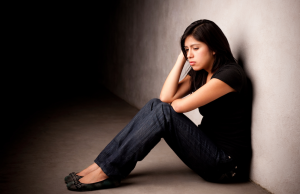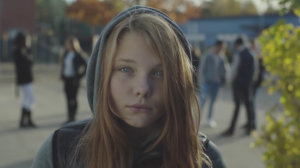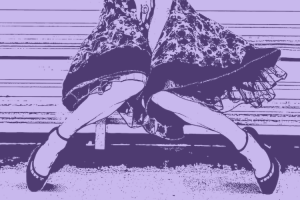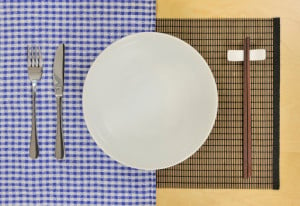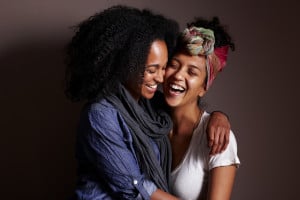Originally published on xoJane and cross-posted here with their permission.
I was in Special Ed all through elementary and middle school, and all I learned was how to eat pizza — lots and lots of pizza.
In third grade, I was diagnosed with two learning disabilities: dyscalculia (the common math one), and language processing (I have trouble recalling information or retrieving words to express something). This diagnosis was absolutely horrifying to my third-grade-curly-haired self. From the way it was presented to me, I knew it was something negative; something no one wanted.
Immediately, I was placed in Special Ed, because that’s what people do with you when they can’t figure you out.

It was fun for a while. I got to leave certain classes early to go hang out with the other “slow” kids. It was the one place I could be myself, because there were no popular kids around to intimidate me. We also would get snacks all the time. It was similar to being in kindergarten and having a milk break — except, we had pizza breaks.
All through elementary school, I felt different and extremely stupid. In fact, I had many teachers who actually said things like, “You’re not going to be able to do things like other kids,” or “We don’t expect you to do this that well, because you’re not as smart as the others.” Literally.
Or, some teachers would say, “Oh, that’s just a crutch.” No, it’s not a crutch — though, if I want to use it as a crutch, that’s my damn right.
I had one really amazing teacher in Special Ed, named Ms. Conaway, but she was the only one who actually taught us anything. The other Special Ed teachers didn’t do much. Even my third-grade self questioned why they were the ones in charge. We would sit around, talk, stare at the walls, some people would be drooling — you know, that kind of thing.
Did I mention we ate a lot of pizza?
This is, of course, the problem with Special Ed. (I hear much hasn’t changed from when I was in it 12years ago): No one knows what to do with you, so they take you out of your regularly scheduled classes, and put you with kids who are maybe, kinda-sorta like you in one large room, and let you sit and think about why you’re there.
It all ends up feeling like “The Room for the Unwanted.” You, as a kid, inevitably feel like you’ve been bad. This is where “bad” kids go — and not even “cool” bad kids.
It’s really difficult to be a girl-child in general, but to be labeled “disabled,” and be a girl in this society is a lot to handle. I knew other girls like me in school, but I didn’t want to associate with them because I wanted so badly to fit in and to be considered “normal.” Even though my disability can’t be seen, I felt like I wore it on my sleeve.
I hate that word, “disabled.” It makes me feel like I can’t breathe — like I’m “slow” and “different,” and it’s always used in a negative way. Perhaps this is why I still have trouble telling people, even my closest friends, that I have a learning disability. I worry they will look at me differently. I worry they will pity me.
Leaving my regular class to go to Special Ed was always humiliating. I would have to leave in the middle of class, and one of my teachers — who was terrible and obsessed with pigs (whatever) — stopped the class once to ask me and the other girl who was leaving, “Where are you two going?” I remember thinking, “Like you don’t fucking know.”
This was just a way for my teacher to feel in control and to embarrass me in front of everyone. My soft voice (I had a much quieter voice at the time) would say, “Um, we have to go to Ms. Conaway” — I remember pleading with my teacher, through my large eyes, not to make me say “SPECIAL ED.”
The teacher finally responded: “Oh, that’s right. OK.” Phew, I thought.
When I got to middle school, Special Ed was even worse. There was even less for us to do, and I was becoming a dreaded teenager, so I had crushes on boys that were never reciprocated. Leaving in the middle of class during this time was agonizing. My sexuality was budding, and I remember thinking, “No boy is ever going to want me, because I’m disabled.”
Even back then, I felt like having a learning disability would keep anyone from sexuallly desiring me.
I finally stopped going to Special Ed in high school, even though I still had an IEP (Individualized Education Plan — all us LD people have them). My IEP seemed to signify to shitty teachers, “Hey, don’t expect too much from this kid — she’s not right in the head.”
I also feel like it lets a lot of teachers off the hook (those that are looking for an easy way out), because it tells them, “Look, you can’t possibly teach this kid anything, because their brain is messed up, and that’s not your fault, so if you fail at teaching them no worries!”
One teacher asked me, after I had done poorly on a test: “So what happened? Does the word ‘test’ scare you?” I was incredulous. No, you crazy bitch. Words do not scare me. What scares me is people like you who have somehow managed to be a teacher, and not give a shit about students who learn differently from the majority.
Many scenarios like this occurred at an alarming rate.
My time in Special Ed wasn’t all bad, but it seems as though some education professionals still have no idea what to do with kids who have disabilities of any type. Not to mention, the stigma is ever present.
I had some damn good pizza, though.
Lachrista Greco is a freelance Italian American feminist writer and yoga instructor based in Madison, Wisconsin. She is currently putting together an anthology called, Olive Grrrls: Italian American Women & The Search for Identity. Lachrista is also the creator of the well-known, Guerrilla Feminism page on Facebook. She has also recently started a yoga studio, called Luna Yoga, slated to open at the end of August/early September, specializing in yoga for survivors of sexual violence, as well as for people with disabilities. You can find out more by visiting her website: Rebel Grrrl Italiana.
Search our 3000+ articles!
Read our articles about:
Our online racial justice training
Used by hundreds of universities, non-profits, and businesses.
Click to learn more






